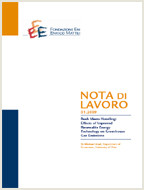Efficiency under a Combination of Ordinal and Cardinal Information on Preferences

10.01.2011
Stergios Athanassoglou
C61, D01, D60
Random Assignment, Efficiency, Duality, Linear Programming
Climate Change and Sustainable Development
Carlo Carraro
Consider a collection of m indivisible objects to be allocated to n agents, where m ≥ n. Each agent falls in one of two distinct categories: either he (a) has a complete ordinal ranking over the set of individual objects, or (b) has a set of “plausible” benchmark von Neumann-Morgenstern (vNM) utility functions in whose non-negative span his “true” utility is known to lie. An allocation is undominated if there does not exist a preference-compatible profile of vNM utilities at which it is Pareto dominated by another feasible allocation. Given an undominated allocation, we use the tools of linear duality theory to construct a profile of vNM utilities at which it is ex-ante welfare maximizing. A finite set of preference-compatible vNM utility profiles is exhibited such that every undominated allocation is ex-ante welfare maximizing with respect to at least one of them. Given an arbitrary allocation, we provide an interpretation of the constructed vNM utilities as subgradients of a function which measures worst-case domination.
***
Suggested citation: Stergios Athanassoglou, Efficiency under a combination of ordinal and cardinal information on preferences, Journal of Mathematical Economics, Volume 47, Issue 2, March 2011, Pages 180-185, ISSN 0304-4068, http://dx.doi.org/10.1016/j.jmateco.2011.02.001
